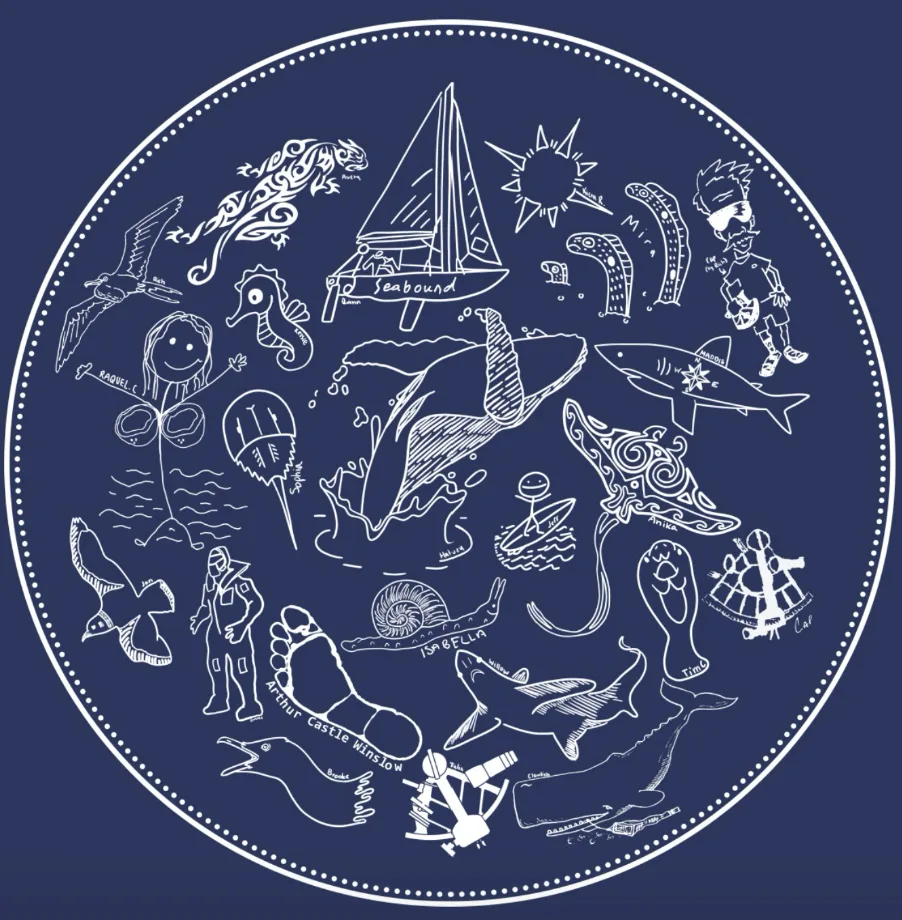Programs Blog
Creative Endeavors on Shore

Tuesday, September 24th
Location: Library (1st floor of Madden Center on SEA Campus, Woods Hole)
Weather: Cloudy, 64˚ F
My name is Isabella, and I am a junior at Macalester College in St. Paul Minnesota majoring in Chemistry and Environmental Studies. I am from a small town in Vermont, about 30 minutes south of Burlington. I’m so happy to be able to experience a New England fall for the first time in two years (at least until we fly out to Fiji on October 4th). The trees are just starting to change colors, and it is making me excited for all of the changes to come when we board the ship! That is in only 9 more days for those of you who are counting (I am!).
For today’s blog post, I am going to talk about one of the assignments we had for our Environmental Communication course, taught by Professor Rich King. It was called the “Open Genre and Audience Science Story.” First, we had to choose a recent scientific paper that is relevant to the area we’ll be sailing in. The topics of the papers ranged from bycatch of seabirds, to college student understanding of climate change, to a 36-year study of ocean temperatures around New Zealand.
Then, our next assignment was to write a science reportage story about our paper where we explained the findings to a general non-science audience. It was actually harder than I had expected–my paper was about a computational/predictive study of sediment transport rates in the Kwajalein atoll reef in the Republic of the Marshall Islands. I had to wade through pages of dense mathematical equations and computer jargon to decide which information was actually vital to explaining (in 1000 words, no less) the researcher’s findings. I’ll distill it even further here: sea level rise is predicted to affect wave movement and therefore sediment transport rates from the coral reef to the beach are predicted to decrease, causing erosion.
After we had finished our science reportage story, we could then move on to the Open Genre piece. We were basically given full creative freedom to interpret our papers in whatever form and for whatever audience we wanted. It was amazing to see the different mediums my classmates chose when we presented yesterday: one person composed a song that represented whale stranding, another created a collage-style zine with cut paper, another used AI to create a cover photo for the fictional short story they wrote about marine heat waves and cool spells, and yet another created a lesson plan about phytoplankton for elementary school kids. I was blown away by the talent that my classmates showed during their presentations, especially from people that said that they weren’t confident with art or that this was the first time they had tried making a zine or comic or children’s book. I felt like I really got to know another side of each of my classmates that I haven’t seen in class or in the cottages.
I can’t wait to see more of the art we create on the ship, and for our class t-shirts to be ready–we all (including our professors and program assistant) made a little doodle and signed our names, which will get printed in white on the back of blue t-shirts.
Lastly, I want to give a shout out to Hadley and Colin- thank you for letting me crash at your apartment and to Abby and Bella- thank you for the best birthday present I could ever ask for (you are basically Bostonians now). I miss you all!
Recent Posts from the Ships
- Ocean Classroom 2024-A collaborative high school program with Proctor Academy
- Collaborations and Long-term Commitments: SEA’s Caribbean Reef Program Sets a Course for Coastal Programs that Compliment Shipboard Experiences.
- Sea Education Association students prepare for life underway using state of the art nautical simulation from Wartsila Corporation.
- SEA Writer 2022, Magazines From the Summer SEA Quest Students
- Technology@SEA: Upgrades Allow Insight into Ocean Depths
Programs
- Gap Year
- Ocean Exploration
- High School
- Science at SEA
- SEA Expedition
- SEAScape
- Pre-College
- Proctor Ocean Classroom
- Protecting the Phoenix Islands
- SPICE
- Stanford@SEA
- Undergraduate
- Climate and Society
- Climate Change and Coastal Resilience
- Coral Reef Conservation
- Marine Biodiversity and Conservation
- MBL
- Ocean Exploration: Plastics
- Ocean Policy: Marine Protected Areas
- Oceans and Climate
- Pacific Reef Expedition
- The Global Ocean: Hawai'i
- The Global Ocean: New Zealand